We cut from Caspian saying the Telmarines will be there soon to a bunch of them cutting down trees and building a bridge across the ford of Beruna. (In the book, there had already been a town at Beruna for quite some time.) Cutting down trees is a pretty generic way to visually symbolize invasion but, to be fair, the book pretty much handed it to the film.[1]Though in the literary Prince Caspian, the trees had already been cut down long before the story’s main events. Cliches sometimes become cliche for good reason and this scene basically works. I think it would work better though if the previous movie had established this location. Then it would feel more like the Telmarines were defiling an important historical Narnian landmark. Interestingly, a moment deleted from the movie would have shown a dryad reduced to a pile of leaves by her tree being felled.[2]The same thing happens in a different Narnia book, The Last Battle. This would have made what the Telmarines are doing more palpably evil, but it also wouldn’t have made sense since all the tree spirits are supposed to have been comatose for centuries at this point.[3]Maybe it would have worked if Trumpkin and the Pevensies had looked shocked to see the dryad before it died but if you check out the deleted scenes, you’ll see that’s not how the actors … Continue reading
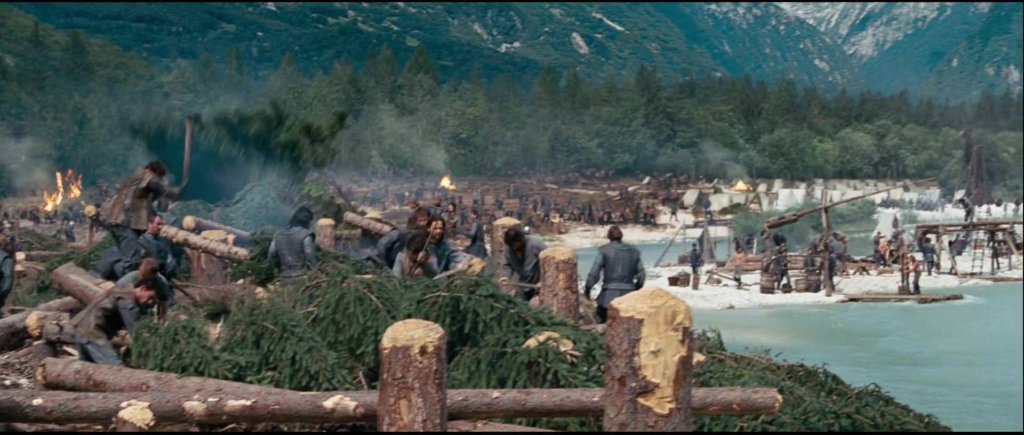
Peter, Susan, Edmund, Lucy and Trumpkin peep over a pile of logs and see the vast number of Telmarine soldiers. They quickly duck down as they see Sopespian and Miraz arrive at the camp on horseback. “Perhaps this wasn’t the best way to come after all,” Susan whispers. Despite Anna Popplewell having great comedic timing, she doesn’t deliver that line in a snarky way, and I believe that was the right decision. In the corresponding scene in the book, the characters run into a Telmarine outpost and have to flee from enemy arrows. Here they sneak away unnoticed, a rare example of the movie removing an action scene from the original story rather than adding one. Fans of the book who dislike this adaptation tend to describe it as putting action above all else. I disagree for reasons I intend to delve into later.
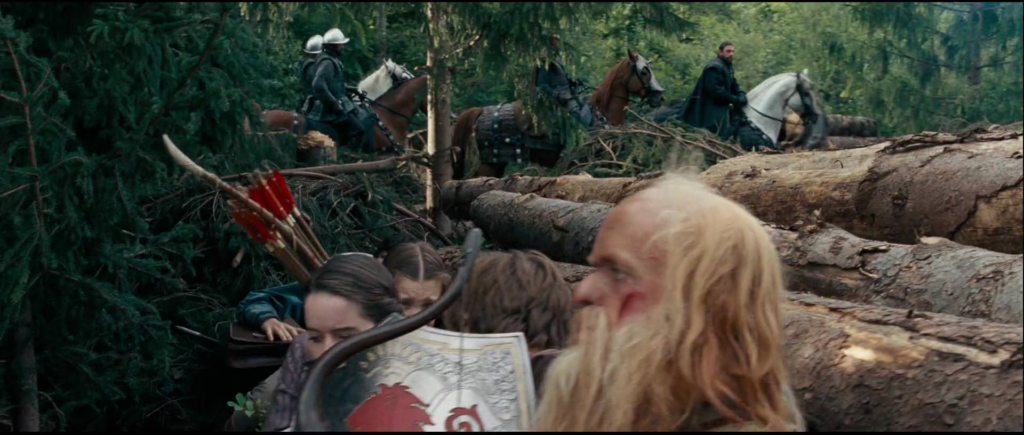
Anyway, for lack of a better idea, our heroes return to the gorge. “So where exactly do you think you saw Aslan?” Peter asks Lucy. “I wish you’d all stop trying to sound like grownups,” she complains. “I didn’t think I saw him; I did see him!” In the book, her equivalent line, which is directed specifically at Susan, is “don’t talk like a grownup.” That strikes me as a lot funnier than “I wish you’d all stop trying to sound like grownups” but the altered line allows the movie its own highly funny moment as Trumpkin says to no one in particular, “I am a grownup.” Lucy walks right up to the edge of the cliff. “It was right over…” Suddenly, the ground gives way beneath her. The others, horrified, rush over to the hole to find that Lucy has landed on a little pathway just below the cliff, one which they can use to climb into the ravine. “Here,” she says happily, finishing her sentence.

This is similar to what happens in the book a little later. There Lucy found the pathway when she was being led by Aslan who is initially invisible to the others. The movie will give us a functional equivalent of that scene at the climax. For now, Trumpkin and the Pevensies carefully make their way down into the gorge and cross the river. At one point, a stone gives way beneath Lucy’s feet and Trumpkin keeps her from falling into the water, further establishing their friendship. I’m not sure how the characters climb up the other cliff but apparently, they do somehow. We cut to night when they’re all lying on the ground, seemingly asleep except for Lucy who stares up at the stars. According to the book, Lucy felt “a thrill of memory” at seeing “after all those years, the bright Narnian stars. She had once known them better than the stars of our own world, because as a Queen in Narnia she had gone to bed much later than as a child in England.” I love that the movie contains a visual reference to this though I’m not astronomically minded enough to say if the stars the movie shows are actually different from the stars in this world.
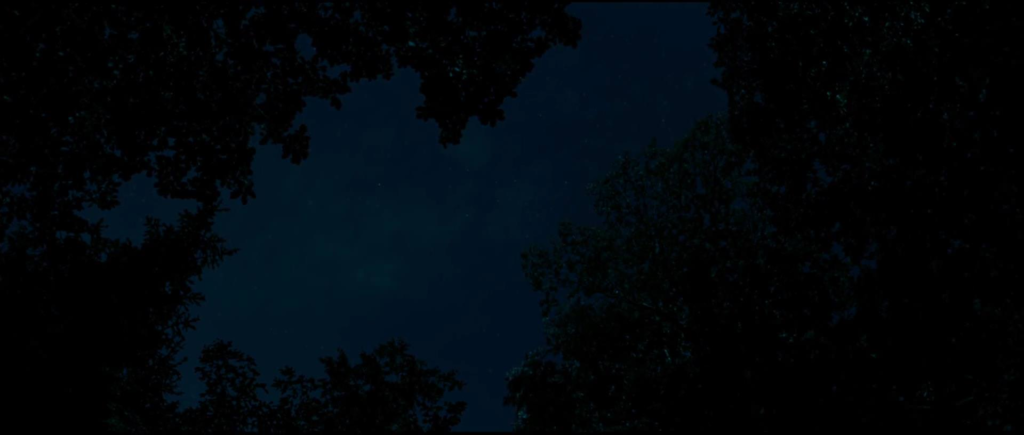
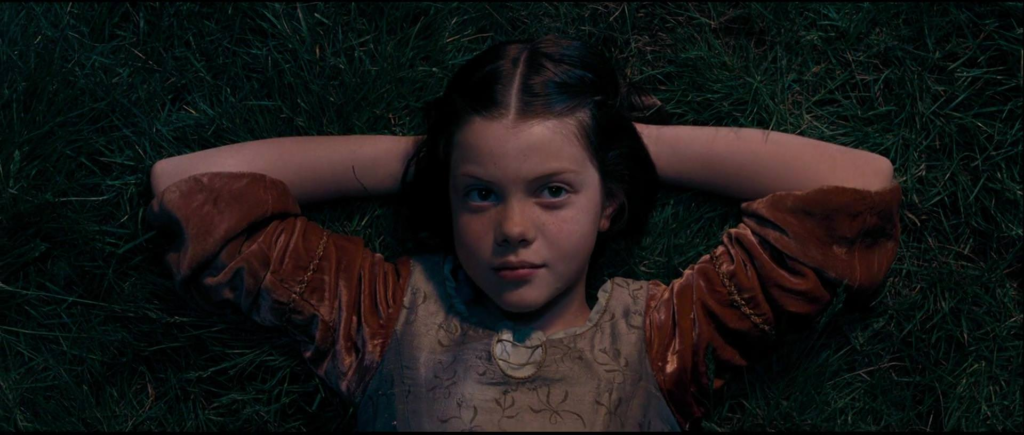
Did you notice how I said the others were seemingly asleep? Well, Susan rolls over and asks Lucy why she thinks she (Susan) didn’t see Aslan. “You believe me?” Lucy asks in surprise. “Well, we got across the gorge,” says Susan. This sort of corresponds to a scene in the book, after everyone, more or less, can see Aslan, when Susan tearfully confesses that she really believed Lucy when she said she saw Aslan but pretended, perhaps even to herself, that she didn’t because she was desperate to get out of the woods and following Trumpkin and Peter’s plan seemed easier than crawling down into the gorge. In the book, Susan is the Pevensie who ends up being an unpleasant jerk for most of the middle section whereas in the movie, it’s Peter. Not that I blame the literary Susan much. If I were hiking through thick woods for hours with nothing to eat but apples and bear meat and no chance of a good place to sleep, I’d be as cranky as she was or crankier. After thinking about her sister’s question, Lucy says she doesn’t know but suggests Susan maybe didn’t really want to see Aslan. That line reminds me of Till We Have Faces even more than the line I described as doing so in the last post! We see that Trumpkin is also awake and listening to this conversation, no doubt wondering if Lucy’s words apply to him.
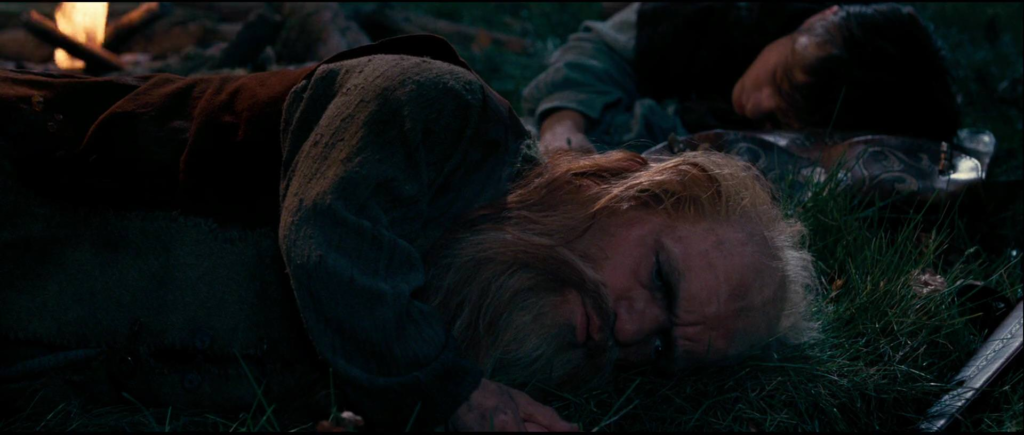
Susan: You always knew we’d be coming back here, didn’t you?
Lucy: I hoped so.
Susan: I finally just got used to the idea of being in England!
Lucy: But you’re happy to be here, aren’t you?
Susan: While it lasts.
Like Susan’s dialogue at the train station, this little scene arguably foreshadows her rejecting her experiences in Narnia as “funny games” she played as a child in the final Narnia story. I like the idea of foreshadowing that in Prince Caspian[4]I’d argue the book version already does so with Lucy’s line about Susan “talking like a grownup” and her deluding herself into not believing that Lucy saw Aslan because … Continue reading but I’m not crazy about this way of doing it. We get the impression of Susan as a victim. If a hypothetical movie of The Last Battle set in this universe had been made, we’d likely get the impression she told herself Narnia was a fantasy because it hurt too much not being able to live there anymore. The book’s implication is more that Susan didn’t want to believe in Narnia because that wouldn’t have fit in with her desire to be one of the cool kids.[5]Critics tend to condemn this part of The Last Battle for vilifying adulthood. Jill, a younger girl who also had adventures in Narnia, says that Susan’s problem is that “she always was a … Continue reading I understand that many readers feel C. S. Lewis threw Susan’s character under a bus[6]Actually, he saved her from being hit by a train. Read the book to get that joke. and there’s something to be said for still keeping her sympathetic. But I think you could still imply that her motivation for denying Narnia is still pride or vanity while still having more empathy for her than C. S. Lewis showed.[7]I would not recommend an adaptation change the ending of Susan’s story and have her reembrace Narnia. Completely ignoring or reimagining controversial endings annoys me. I am open to nuancing … Continue reading Still, credit where credit is due, Anna Popplewell acts the scene beautifully, conveying that Susan is bitter while maintaining the character’s emotionally cool, prim personality and not making it over-the-top.
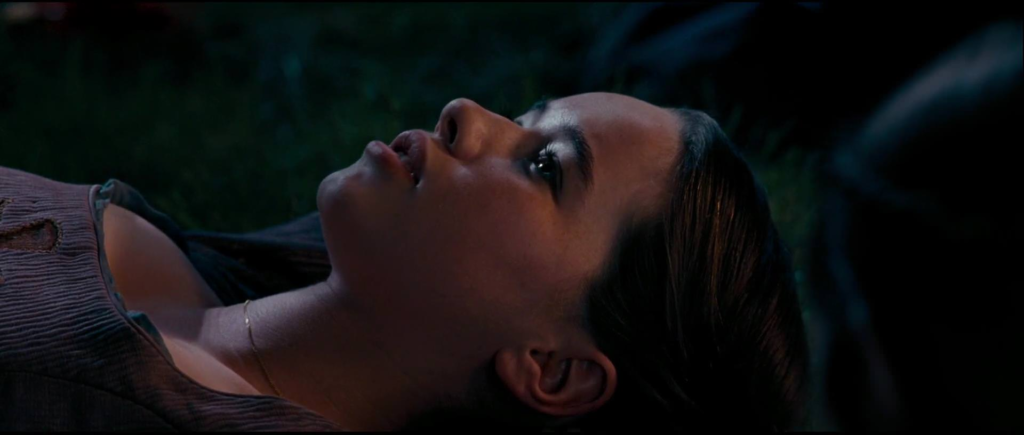
We transition to the same location in the morning. Now Lucy really is the only one awake. It seems that what is keeping her up is a golden light emanating from within the forest. After hesitating, she leaves the others and goes deeper into the trees. This scene’s equivalent in the book took place at night and I’m rather bummed they changed that as I believe moonlight was part of its mysterious and magical atmosphere. What Lucy discovers in the text is a group of trees that seem to be dancing in a circle.
The first tree she looked at seemed at first glance to be not a tree at all but a huge man with a shaggy beard and great bushes of hair. She was not frightened: she had seen such things before. But when she looked again, he was only a tree, though he was still moving. You couldn’t see whether he had feet or roots, of course, because when trees move, they don’t walk on the surface of the earth; they wade in it as we do in water. The same thing happened with every tree she looked at. At one moment they seemed to be the friendly, lovely giant and giantess forms which the tree-people put on when some good magic has called them into full life: next moment they all looked like trees again. But when they looked like trees, it was like strangely human trees, and when they looked like people, it was like strangely branchy and leafy people…
The movie doesn’t manage anything as memorable or magical as that. But it does convey the basic idea that the trees are “almost awake, not quite” to use Lucy’s words from the book. Cherry blossom petals blowing in the wind briefly turn into a laughing dryad. Silver birch trees pull apart, creating a clear path for Lucy.
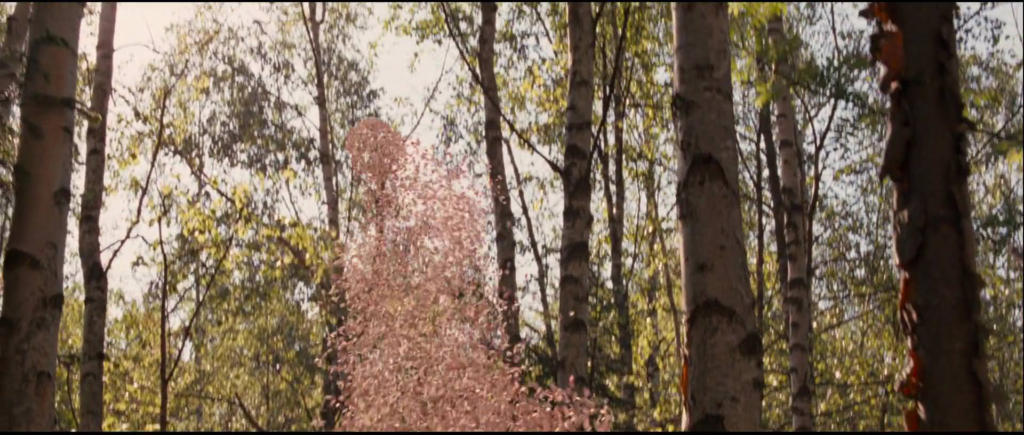
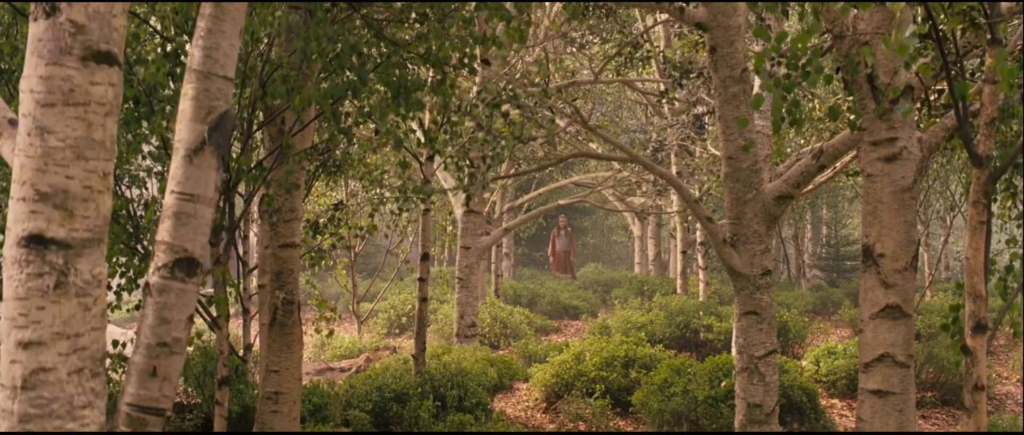
This path eventually leads her to Aslan! Joyfully, she runs over and embraces him. The scene makes excellent use of music from the last one. Unfortunately, we’ve now come to a rather laughable blunder on the part of the script. Here’s a quote from this part of the book.
“Welcome, child,” he said.
“Aslan,” said Lucy, “you’re bigger.”
“That is because you are older, little one,” answered he.
“Not because you are?”
“I am not. But every year you grow, you will find me bigger.”
Here’s how that dialogue goes in the movie.
Lucy: I’ve missed you so much! You’ve grown!
Aslan: Every year you grow, so shall I.
Clearly, the screenwriters wanted to include those memorable lines but, in their haste, they completely missed the point and made them say the opposite of what they meant. Oy vey!
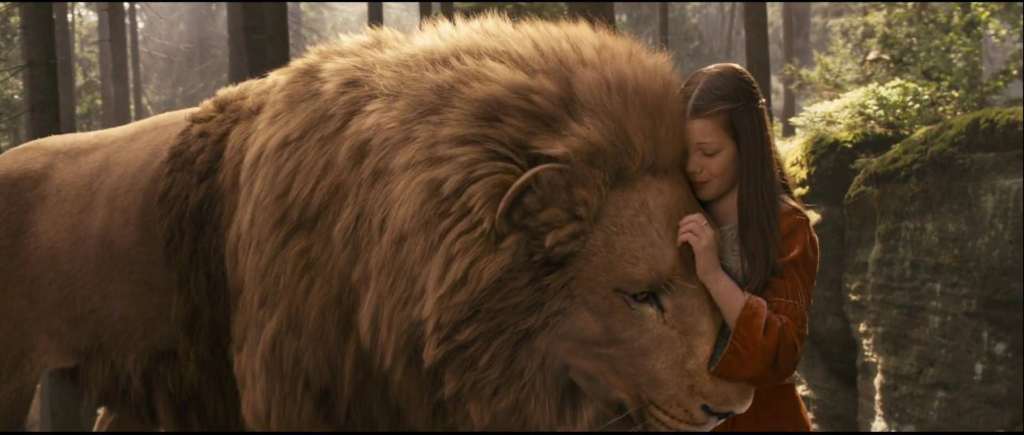
Lucy asks Aslan where he’s been and why he hasn’t come before to help. “Things never happen the same way twice, dear one,” Aslan says. Just then a twig is heard cracking and Lucy wakes up back at the camp. I’ve read some fans sharply criticize the movie for making that scene between her and Aslan a dream, but I’ve never gotten the impression it’s supposed to be only a dream. Another Narnia book, The Silver Chair, has Aslan send someone a dream and The Voyage of the Dawn Treader arguably has it too.[8]In that case, it’s ambiguous how much of the dreamlike scene is real but it has real effects. I just always interpreted this part of the Prince Caspian movie along those lines. I will say though the dream scene would work much better if it ended with Aslan telling Lucy to meet him somewhere or do something. I’m not just saying that because it’d be closer to the book. The story the movie itself wishes to tell would make more sense that way.
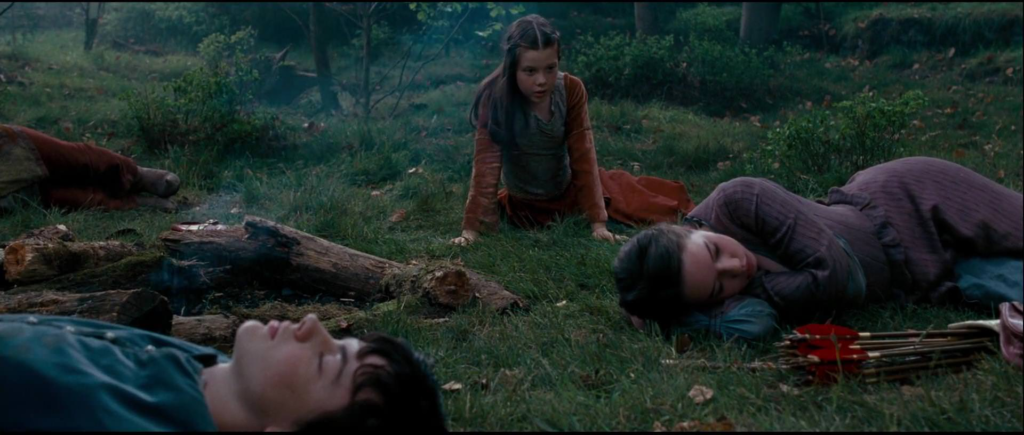
While I might wish the movie had kept the moonlit atmosphere of the scene with Aslan from the book, I have to admit the contrast between the bright golden light of Lucy’s vision and the dim, early morning light when she awakes is great.[9]For the record, that’s not to say the dim, early morning light isn’t beautiful. If anything, I might prefer it. She tries to wake Susan up. Here’s a quote from the corresponding part of the book.
She went to Peter first and shook him. “Peter,” she whispered in his ear, “wake up. Quick. Aslan is here. He says we’ve got to follow him at once.”
“Certainly, Lu. Whatever you like,” said Peter unexpectedly. This was encouraging, but as Peter instantly rolled round and went to sleep again it wasn’t much use.
The movie keeps this hilarious moment but gives Peter’s part to Susan. As I wrote above, the adaptation arguably switches their roles in general. Lucy wanders off in the direction of the twig cracking sound. She sees the same birches she saw in her dream, now immobile, and places her hand on one, saying plaintively, “Wake up.” Of course, nothing happens, and she sadly moves on. This is based on a scene that actually takes place the night before Lucy sees Aslan in the book.
A great longing for the old days when the trees could talk in Narnia came over her. She knew
exactly how each of these trees would talk if only she could wake them, and what sort of human form it would put on. She looked at a silver birch: it would have a soft, showery voice and would look like a slender girl, with hair blown all about her face, and fond of dancing. She looked at the oak: he would be a wizened, but hearty old man with a frizzled beard and warts on his face and hands, and hair growing out of the warts. She looked at the beech under which she was standing. Ah! she would be the best of all. She would be a gracious goddess, smooth and stately, the lady of the wood.
“Oh, Trees, Trees, Trees,” said Lucy (though she had not been intending to speak at all). “Oh, Trees, wake, wake, wake. Don’t you remember it? Don’t you remember me? Dryads and Hamadryads, come out, come to me.”
Though there was not a breath of wind they all stirred about her. The rustling noise of the leaves was almost like words. The nightingale stopped singing as if to listen to it.
Lucy felt that at any moment she would begin to understand what the trees were trying to say. But the moment did not come. The rustling died away. The nightingale resumed its song. Even in the moonlight the wood looked more ordinary again. Yet Lucy had the feeling (as you sometimes have when you are trying to remember a name or a date and almost get it, but it vanishes before you really do) that she had just missed something: as if she had spoken to the trees a split second too soon or a split second too late, or used all the right words except one, or put in one word that was just wrong.
At first, the movie’s version may seem pale and even lame compared to the passage from the book. But I think, practically speaking, Lucy delivering a big speech to the trees, begging them to come to life would have come across as ridiculous, especially if she really seemed to believe it would work. As it is, I feel Georgie Henley’s performance makes the moment nicely sad.
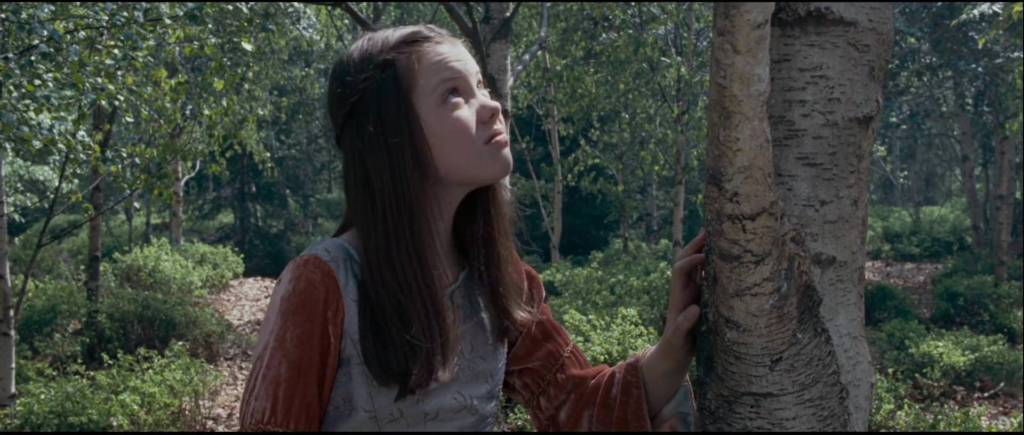
Lucy tentatively starts to call for Aslan when someone clamps a hand over her mouth and pulls her down into the bushes. Fortunately, it’s Peter. He wordlessly points out an armed minotaur nearby. Leaving Lucy in hiding, Peter emerges and draws his sword. Before he can challenge the minotaur though, Caspian jumps in and starts fighting him. Peter disarms his opponent but Caspian ducks right before Peter can slice his head off and Peter’s sword gets stuck in a tree. Caspian kicks Peter aside and tries to pull the sword out. Peter picks up a rock when Lucy calls for him to stop. Peter sees the Narnians, including Nikabrik and Trufflehunter, rally around this Telmarine. “Prince Caspian?” he asks.
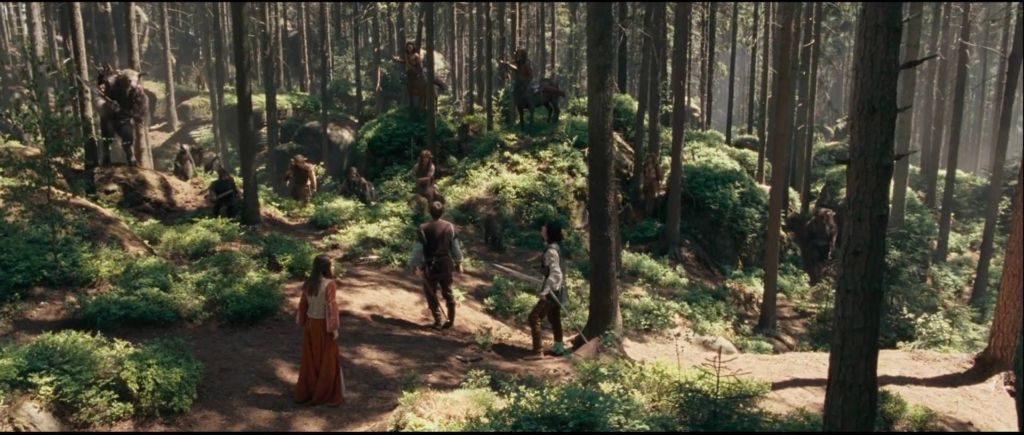
I think the movie’s plot would make more sense if Peter didn’t know Caspian had become the leader of the Narnians even if that would be another change from the book’s story. Trumpkin and everyone just assuming Caspian is their destined king because he blew the horn is never explained well, as I’ve written before, and it’s a bit odd that it would take Peter so long to guess his identity if he was expecting the Narnians’ leader to be a Telmarine youth. Back to the scene. “Yes, and who are you?” asks Caspian. “Peter!” yells a voice. Caspian turns to see Susan (the voice’s owner), Edmund and Trumpkin run up. He looks down at the now dislodged sword in his hand. “High King Peter?” he asks. “I believe you called,” says Peter, trying and failing to sound cool. “Well, yes,” Caspian says, “but…I thought you’d be older.” Caspian, unlike Trumpkin, never expresses surprise at the Pevensies’ ages in the book but I don’t mind the idea as long as he gets over it quickly. In fact, his reaction to seeing the larger-than-life heroes of his bedtime stories as people his own age could be really interesting though the movie, alas, hasn’t established him having enough respect for or interest in them for it to work. “Well, if you like, we can come back in a few years,” says Peter. I enjoy the joke, but I wish Peter delivered it in a jocular way instead of a snobby, offended tone of voice. It’s a line that could have been included in a Prince Caspian adaptation that stayed truer to C. S. Lewis’s Peter if only it weren’t for that tone. Caspian quickly apologizes. “You’re just…not exactly what I expected,” he says, turning an admiring glance at Susan who smiles, appreciative but a little embarrassed by the attention.
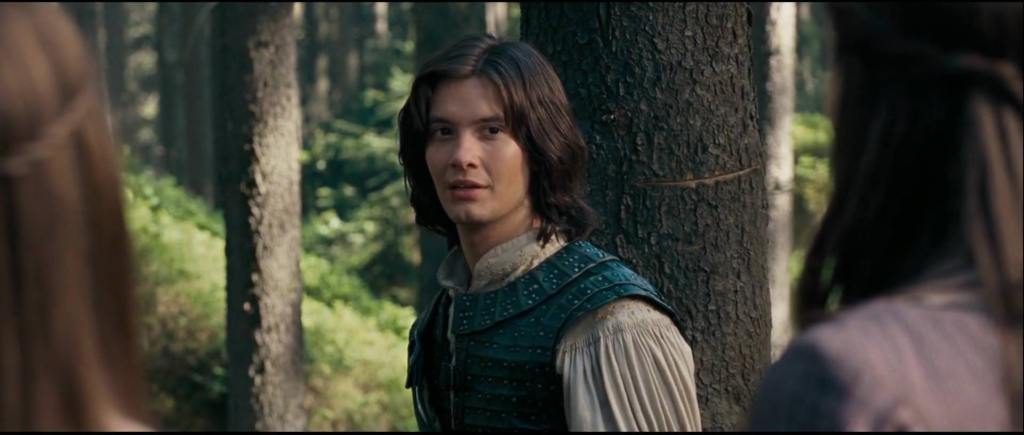
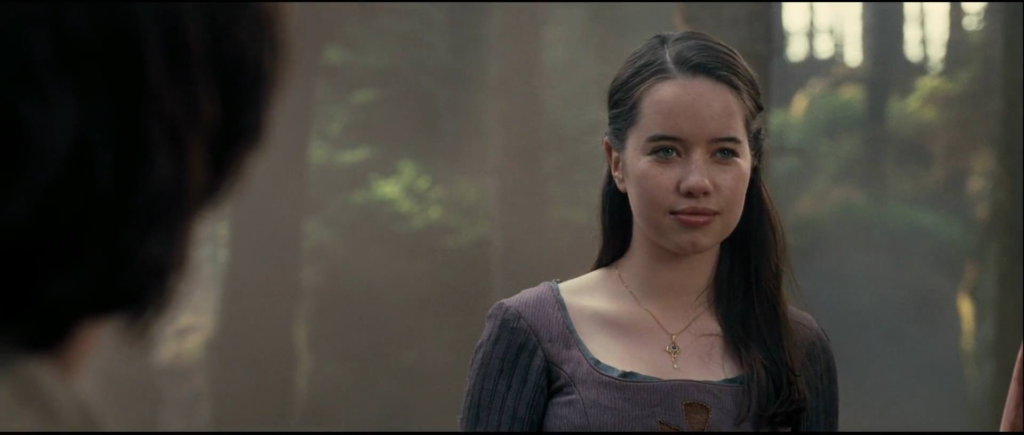
Sigh.
Yes, this adaptation has Caspian and Susan, two characters who barely interact in the book, be in love with each other. It’s such a stereotypically Hollywood thing to do, adding romance between characters who were not romantically involved at all in the source material just because. The best thing I can say is that at this point in the movie, the chemistry between Caspian and Susan is just a humorous little bit of subtext, so it isn’t too much of a nuisance for book fans. I can even enjoy it and laugh at it a bit. Later, the movie will try to make it this big dramatic part of their characters and it’s just dumb, but we’ll get to that in time. Speaking of time, I recommend my readers take a break from reading this and watch this short YouTube video from Narniaweb.com, a site that keeps fans of the books updated on news of adaptations. The video has a rather hilarious and horrifying story about the history of the 2008 Prince Caspian.
Hope that made you laugh. Anyway, in response to Caspian’s “not what I expected” line, Edmund says, “Neither are you,” looking suspiciously at the minotaur. “A common enemy unites even the oldest of foes,” says Trufflehunter. I hate to go straight from one thing about this adaptation that annoys me to another one but here we are. In the book, when it’s suggested that the Narnians should ally themselves with “an Ogre or two and a Hag,” both Caspian and Trufflehunter strongly object.
“We should not have Aslan for friend if we brought in that rabble,” said Trufflehunter…
“Oh, Aslan!” said Trumpkin, cheerily but contemptuously. “What matters much more is that you wouldn’t have me.”
By changing this dynamic, the movie loses the book’s theme of avoiding moral compromises. Well, it doesn’t entirely lose it since later it will have Nikabrik align himself with some other descendants of the White Witch’s followers with nearly disastrous consequences. But it doesn’t set it up nearly as well as the book does. Of course, you could argue that some of the creatures working for the White Witch, such as dwarfs and talking wolves, had good and evil members of their species and minotaurs could be one of those. But I doubt anyone reading the book would have guessed that.[10]And don’t tell me the book sends a bad message by portraying some creatures as inherently evil! They’re fantasy creatures. It’s not like the National Association for the Advancement … Continue reading It feels like the filmmakers just made minotaurs good creatures because they wanted an excuse to have them in every Narnia movie and… I don’t really see what’s so cool about them. They were hardly the most visually interesting of the White Witch’s soldiers. Then again, I suppose the fact that they weren’t grotesquely ugly is what made the filmmakers feel they could make heroes of them.
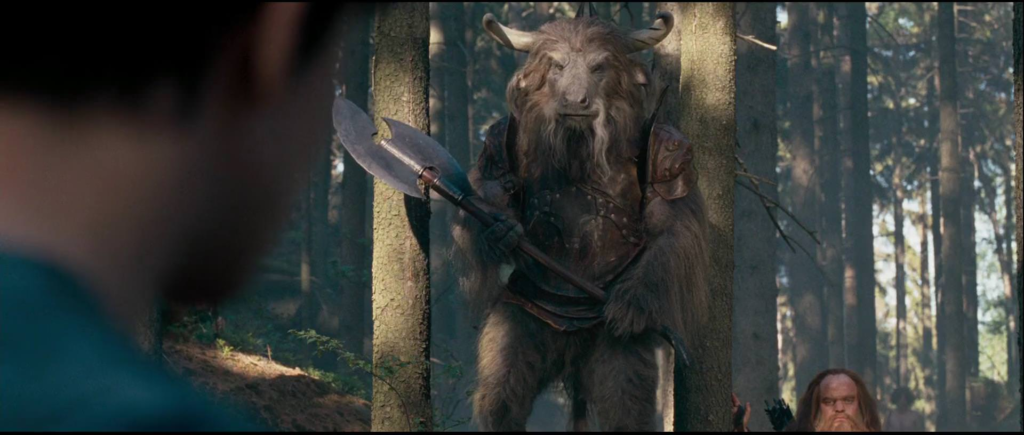
Enough of my complaining. We’ve now reached a fun part of the adaptation. Reepicheep steps forward and bows to Peter. “We have anxiously awaited your return, my liege,” he says, “Our hearts and swords are at your service.” It’s disappointing that Reepicheep is the only Narnian in this scene who seems really delighted to see the ancient kings and queens but like I said this is part of a fun moment. “Oh my gosh, he is so cute,” Lucy whispers to Susan. Reepicheep whips out his sword and spins around. “Who said that?!” he demands. Lucy apologizes and Reepicheep seeing who she is, sheathes his sword. “Oh! Your Majesty. With the greatest respect, I do believe courageous, courteous or chivalrous might more befit a knight of Narnia.” While these two characters don’t interact in the book version of Prince Caspian, according to The Voyage of the Dawn Treader, “Lucy longed…to take Reepicheep up in her arms and cuddle him. But this, as she well knew, was a pleasure she could never have: it would have offended him deeply.” So, this moment in the movie is both great fun for book fans while still making sense and being funny for viewers who haven’t read a word of the books.[11]I’m not sure English girls in the 1940s used the word, “cute,” that way but come on, lighten up! It’s a hilarious moment.
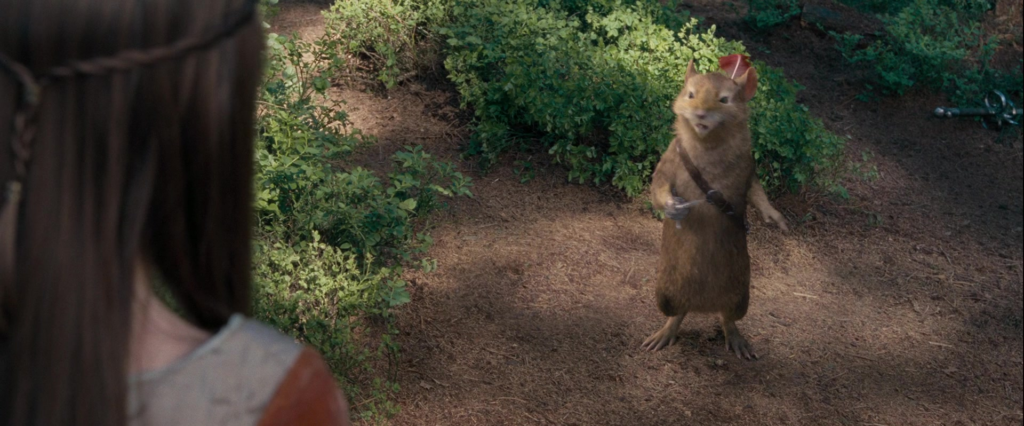
Peter: Well, at least we know some of you can handle a blade.
Reepicheep: Yes, indeed and I have recently put it to good use securing weapons for your army, Sire.
Peter: Good cause we’re going to need every sword we can get.
Caspian: Well then, you will probably be wanting yours back.
He hands Peter back the sword with an attempt at a friendly smile. Peter accepts it without any such attempt and just glares coldly at Caspian.
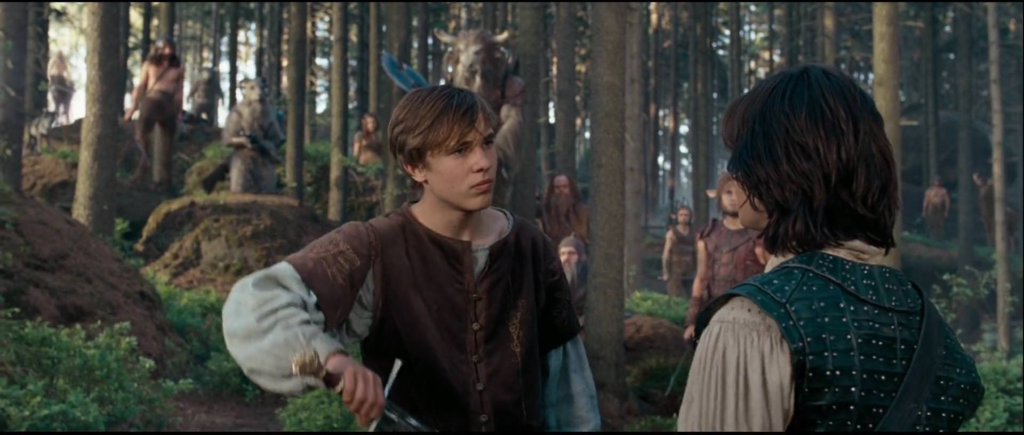
Yeah, this is a big problem for fans of the book and for some of them, the biggest problem with the adaptation. While Caspian and Peter don’t meet until the book is almost over, they’re relationship is perfectly friendly. When Peter sees that Caspian is overawed by his presence, he addresses him as “Your Majesty” and tells him “I haven’t come to take your place, you know, but to put you into it.” A page or two later, Caspian is described as liking Peter very much. In the movie…not so much. I can’t blame any fans for being upset by this character assassination, but I will defend it a bit. I get the impression from some fan complaints that they feel the movie is changing the themes and messages of the book here. But I feel like the basic message is the same. It’s not like the filmmakers read the book and were like, “Peter is a terrible role model for children! The way he peacefully passes on the mantle to Caspian and supports him is just sick! He should be rude and power hungry! That’s how someone should behave in this situation!” I’d say the movie and the book are sending the same message. It’s just that the book is using a positive example whereas the movie is using a negative one. Of course, if you grew up with High King Peter as your role model, I understand that there’s no way you can ever accept this change. (Personally, I grew up with Polly Plummer from The Magician’s Nephew as my Narnian role model because of her talent for telling the other characters exactly what’s wrong with them. Maybe it’s just as well this series of adaptations never got around to her story.) I’ll also reiterate that I think Peter’s reaction would work better if he hadn’t known that Caspian was the leader of the Narnians even though that would take the story even further from the source material. If Peter were expecting to resume his role as King of Narnia and then were surprised to learn that he was supposed to set this wet-behind-the-ears boy on the throne, especially if that boy were a member of the royal family that conquered Narnia, I think viewers would sympathize with his feelings more. At least Caspian is likeable in this scene as it is. How long will that last though?
Next Week: What Was That Reepicheep Said About Recently Securing Weapons?
References
| ↑1 | Though in the literary Prince Caspian, the trees had already been cut down long before the story’s main events. |
|---|---|
| ↑2 | The same thing happens in a different Narnia book, The Last Battle. |
| ↑3 | Maybe it would have worked if Trumpkin and the Pevensies had looked shocked to see the dryad before it died but if you check out the deleted scenes, you’ll see that’s not how the actors played it. |
| ↑4 | I’d argue the book version already does so with Lucy’s line about Susan “talking like a grownup” and her deluding herself into not believing that Lucy saw Aslan because following him would be inconvenient. But many readers apparently find that insufficient to prepare for her later offstage trajectory. |
| ↑5 | Critics tend to condemn this part of The Last Battle for vilifying adulthood. Jill, a younger girl who also had adventures in Narnia, says that Susan’s problem is that “she always was a jolly sight too keen on being grownup.” What these critics never mention is that Polly, an older woman who’s had adventures in Narnia, disagrees, saying that Susan’s real problem is that she refuses to grow up. “Her whole idea of life is to race on to the silliest time of one’s life as quick as she can and then stop there as long as she can.” Do detractors of The Last Battle just skip over that part when they read it? |
| ↑6 | Actually, he saved her from being hit by a train. Read the book to get that joke. |
| ↑7 | I would not recommend an adaptation change the ending of Susan’s story and have her reembrace Narnia. Completely ignoring or reimagining controversial endings annoys me. I am open to nuancing them though. |
| ↑8 | In that case, it’s ambiguous how much of the dreamlike scene is real but it has real effects. |
| ↑9 | For the record, that’s not to say the dim, early morning light isn’t beautiful. If anything, I might prefer it. |
| ↑10 | And don’t tell me the book sends a bad message by portraying some creatures as inherently evil! They’re fantasy creatures. It’s not like the National Association for the Advancement of Minotaurs was going to object to the movie. |
| ↑11 | I’m not sure English girls in the 1940s used the word, “cute,” that way but come on, lighten up! It’s a hilarious moment. |

Love reading these every week. I was initially surprised by how they portrayed Peter in this movie but l also like it. Both Peter and Susan are teenagers. What teenagers aren’t moody at times and unpredictable. Remember they had experienced Trauma in both of their worlds. Peter seemed to have overcome it but I wonder if Susan ever did. She was described as being a very beautiful queen and would’ve had considerable power, only to be suddenly yanked out and thrust back into post war England. She might’ve been immature as described “In the Last Battle ” but I feel sorry for her and I like to believe she would eventually be redeemer.
Glad you’re enjoying these. I should warn I may be taking a break soon, but it should only be for one week. (FWIW, I don’t know any fans who think Susan wouldn’t be redeemed.)